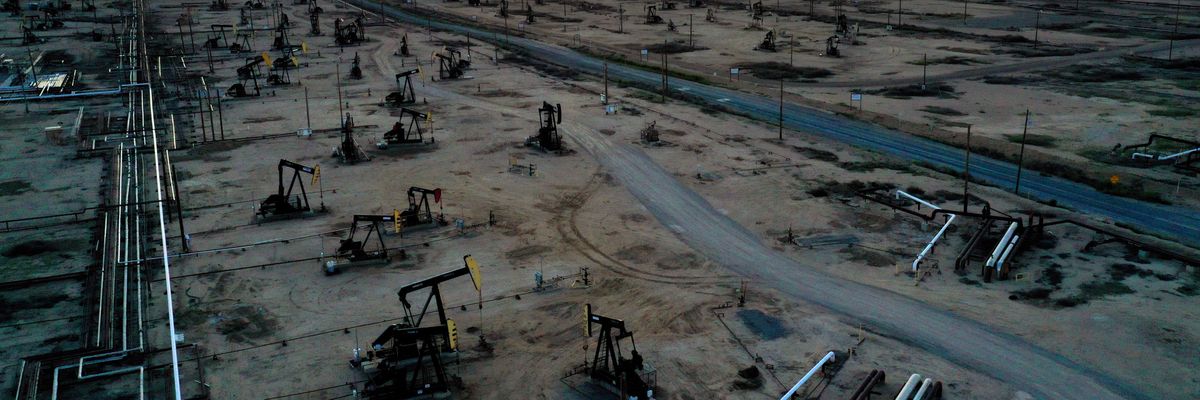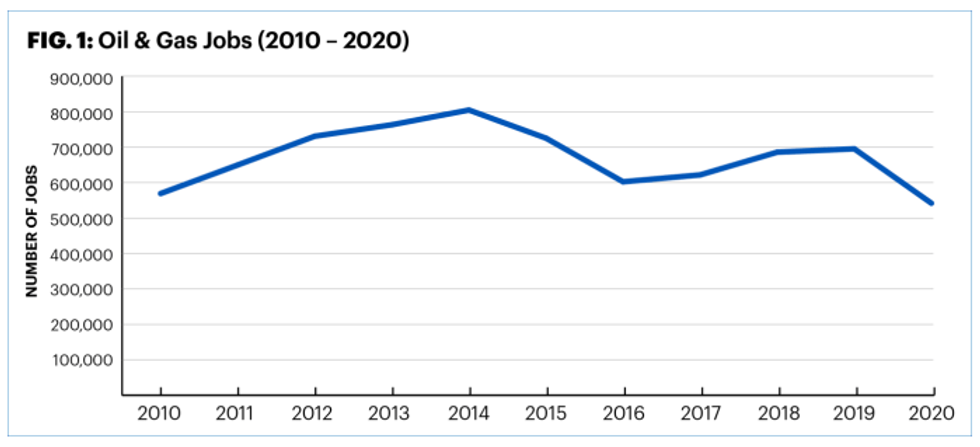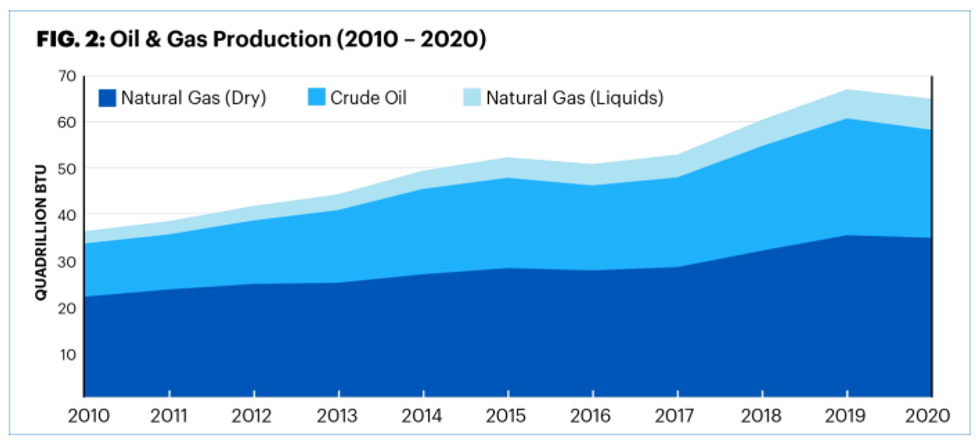Although oil and gas production increased in the United States from 2010 to 2020, new research out Wednesday reveals that last decade's boom coincided with a decline in drilling and fracking jobs--giving lie to the fossil fuel industry's claims about its positive impact on employment.
"Outlandish jobs claims have one goal: to hype the scope and impact of the oil and gas industry."
Industry proponents routinely fearmonger that reining in fossil fuels will have harmful economic effects. However, as Food & Water Watch (FWW) shows in its analysis of data from the Bureau of Labor Statistics (BLS), "increased production does not actually guarantee more jobs." Oil and gas corporations have spent the past several years laying off workers while boosting extraction--and yet they continue to tout "bogus employment claims."
"A 2020 report from the American Petroleum Institute (API), an oil industry trade association, breathlessly warned that a ban on fracking and federal leasing for oil and gas extraction could cost 7.5 million jobs," FWW points out. "API's 2021 report claimed that the industry directly employs 2.5 million and supports 11.3 million jobs."
"In reality," researchers found, "in 2020 the oil and gas industry employed only 541,000 people nationally, which is less than 0.4% of all jobs in the United States."
Employment in the oil and gas sector decreased significantly in 2020, dropping by 22% amid a 3.1% decline in production. While that wave of job losses was blamed on the Covid-19 pandemic, it marked the intensification of a trend that stretches back several years.
"Before the latest bust," notes FWW, "the oil and gas industry never reached levels of employment seen in the 2014 boom--by 2020, jobs in the oil and gas industry were at the lowest levels in over a decade, down 33% from the 2014 peak."
Oil and gas production, meanwhile, rose by 32% after 2014, peaking in 2019 before a temporary and slight dip in demand emerged during the first year of the ongoing public health crisis.
That the recent expansion of domestic fossil fuel production has not been accompanied by job growth exposes how "oil and gas are cyclical industries prone to boom-and-bust cycles--bringing influxes of activity, but leaving behind a poisonous environment and a toxic legacy when the money leaves," states the FWW report.
According to Food & Water Watch senior researcher Oakley Shelton-Thomas, "This research shows that the industry's jobs claims are not only wildly inaccurate, but that they are able to bring more oil and gas out of the ground with fewer workers. When the jobs disappear--especially in bust years like 2020--workers and frontline communities bear the pain."
Notably, a survey released two months ago showed that 56% of workers in the global oil and gas sector want to pursue employment in the renewable energy industry, up from 39% in 2020.
That year, despite receiving trillions of dollars in annual subsidies plus additional bailout money due to the Covid-19 pandemic, oil and gas companies responded to the coronavirus-driven decline in demand and prices by firing tens of thousands of workers, rather than furloughing them while production decreased.
FWW's new report stresses that "the public and policymakers are being misled by deceptive models and inflated numbers that do not add up."
The "gap between industry jobs misinformation and reality" is especially wide in key oil and gas-producing states, according to FWW. The report highlights three examples:
- In Pennsylvania, API claimed that a fracking ban would cost 551,000 jobs. In reality, only 24,635 of the state's more than five million workers are employed in the oil and gas industries. Last year, employment in those fields shrank by 20.5%, even as record amounts of gas were produced.
- The New Mexico Oil and Gas Association claimed that halting fracking on public lands would cost 60,000 jobs. But total oil and gas employment in the state is only about 20,000, or 2.6% of the workforce. Experts predict that jobs in the industry, which fell by about 25% in 2020, will not return.
- In California, the Western States Petroleum Association claimed that the oil industry supports roughly 368,000 jobs in the state. But according to BLS data, just 22,000 Californians work in the industry, down 40% since a 2012 peak. Overall, oil and gas production accounts for barely one-tenth of 1% of all employment in California.
FWW argues that these "outlandish jobs claims have one goal: to hype the scope and impact of the oil and gas industry."
Researchers at the organization have "extensively documented the flaws with the oil industry jobs studies, including what appear to be basic arithmetic errors such as double counting and the inclusion of entirely unrelated jobs in their estimates," states the report. It continues:
One of the most misleading aspects of industry jobs analysis is the conflation of direct jobs with indirect and induced jobs. Direct jobs are positions directly within a given industry. Indirect jobs are those within the supply chain that supports that industry, while induced jobs are positions supported by wages from both direct and indirect jobs. Indirect and induced jobs account for nearly 75% of the top-line numbers that some oil and gas companies are referencing. Misattributing these jobs to the oil and gas industry itself distorts the size and scope of the industry's payroll.
In other words, the jobs that these companies identify as being endangered would only be "lost" if the alternative to investment in oil and gas had nothing to do with capital and did not involve using power or energy. This is a false choice. In reality, the alternative to fracking (and other oil and gas investment) would have been, and could still be, large-scale investment in clean, job-creating renewable electricity technologies. Fracking jobs can instead be green energy jobs.
Shelton-Thomas said in a statement that the fossil fuel industry's employment promises--used "to gain political leverage"--have "impeded the necessary transition to clean, renewable energy."
"We need a New Deal-scale green public works investment to create real green jobs and stave off the worsening effects of climate catastrophe."
Despite climate scientists' repeated warnings about the need to keep coal, oil, and gas in the ground to have a fighting chance of limiting global temperature rise to 1.5oC above preindustrial levels by the end of the century, fossil fuel corporations are currently planning to expand extraction in wealthy and impoverished nations alike.
Though the Big Oil lobby argues that decarbonization will leave millions of workers unemployed, advocates for a just transition have long emphasized that the shift to a post-carbon economy should be treated as an opportunity to create good-paying jobs that simultaneously reduce greenhouse gas pollution and inequality.
A study published last year found that shifting from fossil fuels to renewables would add eight million jobs worldwide, boosting overall employment in the energy sector by more than 40% by 2050. Another recent study confirmed that green public spending yields far more jobs than unsustainable investments.
"The oil and gas industry and its proponents are misleading the public and policymakers about the economic benefits produced by this destructive industry," concludes FWW's new report. "Their false claims do not add up and cannot be allowed to stall a rapid transition to 100% clean, renewable energy. We need a New Deal-scale green public works investment to create real green jobs and stave off the worsening effects of climate catastrophe."



